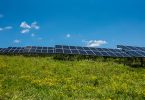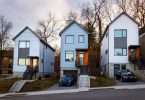Project will explore feasibility of providing Hill District residents with low-cost energy as well as opportunities to improve efficiency of older Hill District homes
A grant of technical assistance from the U.S. Department of Energy (DOE) is enabling the Green Building Alliance and its partners to assess environmentally compromised vacant lots of public land in the Hill District as potential renewable energy generation locations. While working to establish a neighborhood-scale clean energy plan, this project will also explore opportunities to retrofit older homes in the Hill District to make them more energy efficient.
The Hill District’s sloping topography and history present environmental constraints to commercial and residential development of these parcels, which are located over abandoned coal mines, with a coal seam running below. Technical expertise provided by the National Renewable Energy Laboratory will enable the evaluation of the approximately 600 acres of undermined land as potential future locations for solar, thermal, or small-scale wind energy generation.
If the land is found to be viable, clean energy generated at these locations would be designated to serve Hill District residents, lowering heating and cooling utility costs for those living in the neighborhood. The associated energy cost savings would be designated to benefit residents of the Hill District.
The Green Building Alliance and its partners are also interested in exploring the possibility of directing revenue generated through excess clean energy production to a community fund managed by a community organization. The funds could then be designated to support neighborhood initiatives such as land maintenance, tree plantings, or other amenities and improvements.
“In Pittsburgh, 61 percent of the housing stock is over 100 years old,” says GBA Executive Director Jenna Cramer. “The majority of these homes are energy inefficient, with high maintenance costs due to aging systems and higher year-round energy bills. This creates a disproportionate financial burden to Hill residents, 40% of which are living under the poverty line. By assessing opportunities to retrofit older homes and generating clean, renewable energy on site, we would be able to pass on savings to those living in the Hill District, while also contributing to a healthier community for all. ”
Green Building Alliance project partners on this project include the City of Pittsburgh Department of City Planning, the Energy Innovation Center, and Duquesne Light Company.
Contact info@pittsburghgreenstory.com for press inquiries.







